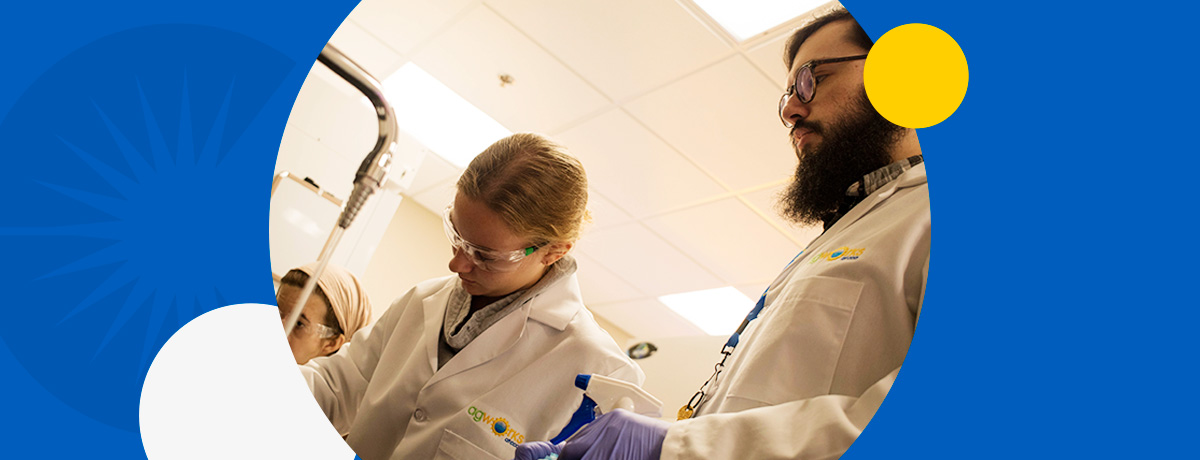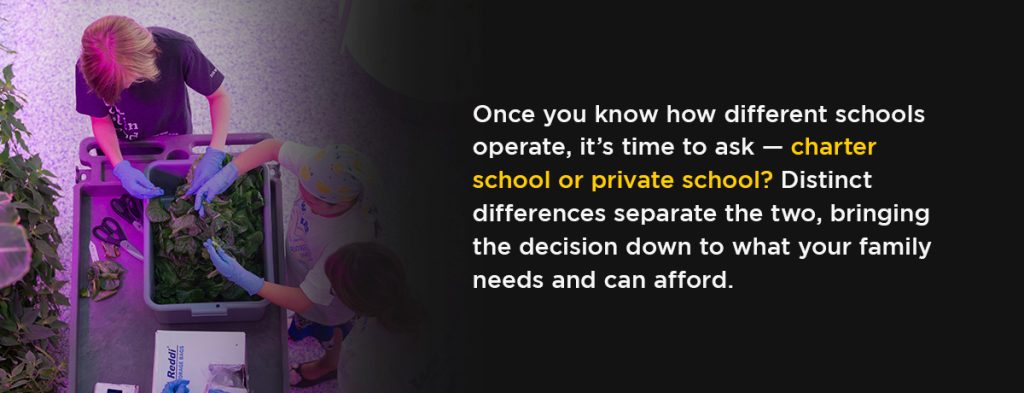2025-2026 School Year Enrollment Now Open. Click Here
2025-2026 School Year Enrollment Now Open. Click Here

“Traditional public schools don’t work for every child. Many are so rigid that they don’t allow children to learn at their own pace or according to their unique learning styles. Others turn a blind eye to bullying. When school is an unhappy place, kids don’t want to go to class and they miss out on the joy of learning. Parents searching for options are probably asking themselves about the difference between charters and private schools. They know there is a better way, but they’re confused about the difference between a charter school and private school. Once parents learn how each operates, they may realize cyber charter school is a public option that makes the perfect fit.
Most families know how traditional school works. Kids file into a building. They learn a curriculum developed in accordance with the state’s standards. Teachers are employed by the school district. Funding comes from local property taxes mixed with state and federal taxes. In recent years, the flaws behind this model have become apparent. Families have little say in how their children are educated. Schedules are inflexible. Lessons target the average student, discouraging those who need more help or greater challenges. Charter schools are different. In Pennsylvania, they are still public schools but families have control. Charter schools get a “charter” to operate from state and local authorities. They must abide by state educational standards, and students take state achievement tests to show their mastery. They must follow laws regulating special education, civil rights, employee background checks, and other important areas. From there, the trustees or boards of charter schools have the freedom to establish their own cultures and values. Most importantly, a charter school has ultimate accountability in that they only continue to exist by serving enrolled families well. In the 1980s, when charter schools first emerged, they were based in buildings. Each forged its own culture and values. In the digital age, the only physical boundaries of many charter schools are state lines. These cyber charter schools, as they are known, deliver learning straight to the home and give families the flexibility to pursue their own lifestyles and priorities. Children are safe from bullies and toxic atmospheres. Parents can monitor lessons, engaging with teachers when their kids struggle or need an extra challenge. A good cyber charter school like Commonwealth Charter Academy leverages technology to personalize learning for the needs and interests of your child.
Find Out More Information About Cyber Charter Schools
Individuals exploring this educational path can choose from many types of private schools. Some types of these schools include:

Once you know how different schools operate, it’s time to ask — charter school or private school? Distinct differences separate the two, bringing the decision down to what your family needs and can afford.
Charter schools get their approval to operate from the state and their local school districts. They must prove their academic credentials and capabilities, and teachers are state-certified. Pennsylvania’s private, nonsectarian schools must be licensed by the State Board of Private Academic Schools, attesting that they uphold quality education and standards comparable to public school requirements. However, nonpublic schools associated with genuine religious institutions can be licensed (but not required). These private and nonpublic schools can also be accredited by recognized accreditation bodies that certify their ability to measure academic and operational performance.
Money matters when it comes to educating your kids. Public charter and cyber charter schools offer an excellent education at no cost to families. Private institutions rely largely on tuition, donations and endowments to keep their doors open. Private schooling tuition can range from $4,000 to $25,000 a year (or even an astronomical $40,000 for boarding school).
Public cyber and cyber charter schools must enroll students regardless of race, religion, disability, income or gender. Private institutions don’t always have to abide by federal and state nondiscrimination laws so admission policies allow them to reject students based on their demographics.
Charter and cyber charter schools are bound by their charters to provide a free, high-quality education tostudents of all abilities. They can be an excellent choice for families whose brick-and-mortar schools fail to accommodate their children with special needs. Many private and nonpublic schools aren’t required to offer special education. Others are designed specifically to serve children who learn differently, and parents might have free enrollment through laws promising public funding for equitable services. While some private schools claim to provide special education, they actually lack the resources and specially trained and certified teachers needed to help studentsreach their full potential. It pays to research them carefully.
Now that you’ve given thought to the question of charter school or private school, it’s time to decide. Which is right for your child?
At their core, cyber charter schools are built on academics and prepare students to be successful adults and good citizens. They recognize that every student has a different learning style, and are structured to accommodate individual needs. Private schools can be limited in their capacity to serve each child according to needs and learning styles (the same rigid instruction that hamstrings traditional brick-and-mortar schooling).
Your child is on a journey of learning and discovery that should never end. The school years offer the opportunity to find passions and nurture talents that lead to lifetime fulfillment. CCA is a cyber charter school that encourages children to explore their interests from a young age and, as they grow, follow paths that prepare them for success after graduation, whether they enter college, career training, the workforce or the military.
When children participate in extracurriculars, they are inspired to engage in school and learning. They also get the socialization opportunities that forge friendships. CCA infuses field trips, extracurriculars, clubs and real-world workplace experiences into its culture, allowing children to explore their passions. Charter and cyber charter school students can also access community activities and volunteer opportunities. And under Pennsylvania law, they must be granted access to extracurricular activities in the public school district where they live.
When choosing between the two school types, parents play different roles in education. Private schools often have powerful school boards headed and funded by parents. They can make decisions about school direction, hiring decisions, and other factors that reflect education quality. At CCA, parents can take a more active role in their individual student’s learning and progress. We encourage parents to serve as their child’s learning coach, working with teachers and administrators to develop a learning environment that supports their unique needs.
Every school has a unique culture. Regardless of which type of education you choose for your child, finding a school whose values match yours is essential for receiving the experience your child and family needs. Some schools might value test scores, teaching standards, class sizes, or athletics, all of which will impact their culture and priorities. Matching your school choice to the values can optimize your student’s education. At CCA, we value many factors to deliver quality education and experiences to students and families. Some of our values include:
Cyber charter schools allow students to connect to teachers and classmates from the comfort of their homes. Teachers live stream and record instructional sessions, so students can tune in live or watch them later. Students receive many benefits from learning in a cyber charter school environment, including:
When considering online school, many parents worry their child will feel isolated. CCA offers many socialization opportunities, from field trips and clubs to internships and career development activities. These activities allow students to meet with others from across the state and connect over common interests.

Cyber charter schooling with CCA offers family flexibility, personalized learning attuned to your child’s learning style, and a secure, at-home environment focused on learning. Open enrollment is year-round, and the support and access to all the equipment needed are provided for a smooth transition. Contact us for information on how CCA can be the best choice for your family and your child’s growth and success. Or, enroll your child online today.”
2025-2026 School Year Enrollment Now Open. Click Here